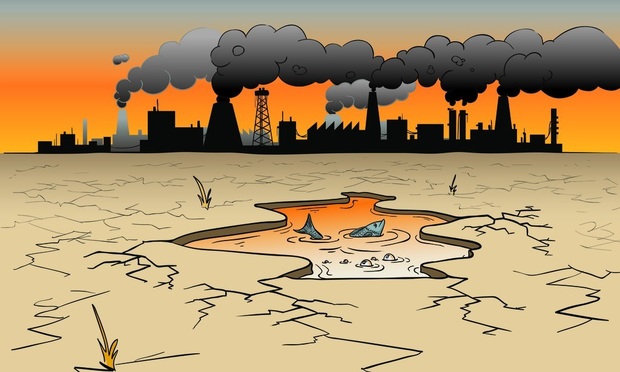Rights and Liabilities When Contaminated Property Is Taken in Condemnation
A thorough understanding of the rights and liabilities of parties to an eminent domain proceeding under the Spill Act and the SRRA is critical to both condemnors and condemnees.
March 28, 2019 at 12:00 PM
6 minute read
 Copyright (C) 2000-2003 Adobe Systems, Inc. All Rights Reserved.
Copyright (C) 2000-2003 Adobe Systems, Inc. All Rights Reserved.
Condemnation proceedings frequently involve properties affected by environmental contamination in various stages of remediation. At one end of the spectrum are properties that have yet to undergo even rudimentary investigation, while at the other are properties that have been fully remediated pursuant to applicable regulations. An article I recently co-authored (See New Jersey Law Journal, Feb. 11, 2019) surveyed the state of the law in that regard under the new regulatory regime pursuant to which oversight has been transferred from the New Jersey Department of Environmental Protection (NJDEP) to licensed site remediation professionals (LSRPs) retained by private sector entities. This article is more narrow in scope and focuses on the specifics of a condemnor's liability under both New Jersey's Spill Compensation and Control Act, N.J.S.A. 58:10-23.11 et seq. (Spill Act), and the more recently enacted Site Remediation Reform Act, N.J.S.A. 58:10C-1 et seq. (SRRA). A thorough understanding of the rights and liabilities of parties to an eminent domain proceeding under those statutes is critical to both condemnors and condemnees.
Condemnor's Spill Act Exemptions
The Spill Act provides an exemption to governmental entitles for properties acquired in condemnation. As of Jan. 2, 1998, N.J.S.A. 58:10-23.11g(d)(4) eliminates the exemption for any governmental entity that has caused or contributed to the discharge of a hazardous substance, or that acquires property then being remediated in a timely manner. That the exemption excludes situations where the condemnor has caused or contributed to a discharge is hardly surprising. The exclusion for properties “being remediated in a timely manner” is significant, however. Although the legislative history for the provision does not explicitly address the rationale for this limitation, the logic behind it appears to be that a property being timely remediated cannot be realistically utilized until the remediation is completed anyway, after which a governmental entity in legitimate need of it could invoke its power of eminent domain, take the property, and preserve its statutory immunity. Pursuing condemnation before that point in time would essentially arrest the process and seize control of the remediation from the landowner. In that instance, it seems fair that if the governmental entity is going to interject itself into the process, it should bear the same consequences as the remediating landowner.
Housing Authority of the City of New Brunswick v. Suydam Investors, 177 N.J. 2 (2003), established a procedure whereby contaminated property would be valued in a condemnation proceeding “as if remediated,” with estimated remediation costs being withheld from the ultimate condemnation award and paid into a trust-escrow account to finance subsequent clean-up costs incurred by the condemnor. The reasoning behind this is that if the value of the property is reduced due to existing contamination, and the condemnor were to also subsequently seek contribution from the condemnee for remediation costs, the property owner is essentially charged twice for the same thing, thus violating its constitutional right to “just compensation.”
Accordingly, although a condemnor will lose the Spill Act exemption if it takes title to a contaminated property prior to completion of remediation, it would be able to maintain its right to a Suydam escrow procedure. In this instance, a condemnor may seek establishment of an escrow for a more extensive remedy than the property owner proposes (to which the owner will undoubtedly object). However, the condemnor would also assume the risk if the amount held in escrow were insufficient to cover unforeseen remediation costs. Thus, the exclusion from the Spill Act exemption for properties still undergoing remediation may serve as a deterrent to condemnors from condemning a property prior to completion of remediation, and particularly from attempting to leverage the Suydam procedure to justify a more expensive remedy than the property owner is implementing.
Interestingly, the statute is silent as to a condemnor's potential Spill Act liability for properties that have already been fully remediated. Borough of Paulsboro v. Essex Chemical Corporation, 427 N.J. Super. 123, 47 A. 3d. 48 (App. Div.), cert. denied, 212 N.J. 460, 56 A. 3d 395 (2012), established that such properties are not subject to the Suydam valuation methodology and escrow protocol. However, that is not to say that the condemnor regains the Spill Act exemption it would have otherwise lost if it acquired the property while it was being “timely remediated.” No reported case has yet addressed this, and it can be expected that condemning authorities and prospective condemnees will have diametrically opposing views.
Condemnor's Post-Acquisition Environmental Obligations
Whether to acquire an easement or fee interest in a contaminated property is also a significant decision for the condemnor. Under the SRRA, the Person Responsible for Conducting the Remediation (PRCR)—usually the party responsible for the discharge, and often the property owner—must apply to NJDEP for issuance of a Remedial Action Permit (RAP). Somewhat counterintuitively, the RAP is issued only after remediation is complete and a Deed Notice, if required, has been recorded. The PRCR remains primarily responsible under the RAP unless that obligation is specifically transferred. The RAP obligations can continue for many years, even decades into the future and often include inspection and maintenance to ensure ongoing protectiveness of engineering controls, submitting biennial certifications of continuing compliance to the NJDEP, and posting financial assurance for these activities.
If the property owner is a different entity from the PRCR, it becomes a “statutory permittee” pursuant to N.J.A.C. 7:26C-1.3, as “a person who subsequently becomes an owner, operator, or tenant of a site for which the [NJDEP] has issued a remedial action permit pursuant to this chapter.” Both parties are jointly and severally responsible for permit compliance, although either one, or even a separate entity, may be designated as having primary responsibility. When title transfers, the secondary permittee obligations will shift, though the PRCR will always remain the primary permittee.
Accordingly, the condemnor of a fee interest will automatically become a secondary co-permittee under any RAP issued pursuant to the SRRA, thereby assuming joint and several liability for permit compliance. N.J.A.C. 7:26C-7.4. As a governmental entity, however, the condemnor remains exempt from the financial assurance obligations, so the NJDEP will look solely to the PRCR for that. An alternative to the new owner becoming a co-permittee on an existing RAP would be to modify the permit and request issuance of a separate RAP for the condemnation parcel.
Conversely, the condemnor of an easement interest has no statutory liability for RAP obligations; however, it may well want to preserve a right to amend or modify the RAP or underlying Deed Notice to permit revisions to an engineering control consistent with the condemnation project. If this cannot be achieved by negotiation with the landowner, and eminent domain proceedings are required, the condemnor should be sure that the aforesaid rights are included within the bundle of rights to be taken.
Alison T. Saling is counsel with K&L Gates in Newark. Her practice includes representing clients in connection with environmental aspects of real estate and corporate transactions.
This content has been archived. It is available through our partners, LexisNexis® and Bloomberg Law.
To view this content, please continue to their sites.
Not a Lexis Subscriber?
Subscribe Now
Not a Bloomberg Law Subscriber?
Subscribe Now
NOT FOR REPRINT
© 2025 ALM Global, LLC, All Rights Reserved. Request academic re-use from www.copyright.com. All other uses, submit a request to [email protected]. For more information visit Asset & Logo Licensing.
You Might Like
View All
Lack of Jurisdiction Dooms Child Sex Abuse Claim Against Archdiocese of Philadelphia, Says NJ Supreme Court
5 minute read
Loopholes, DNA Collection and Tech: Does Your Consent as a User of a Genealogy Website Override Another Person’s Fourth Amendment Right?
Trending Stories
- 1States Accuse Trump of Thwarting Court's Funding Restoration Order
- 2Microsoft Becomes Latest Tech Company to Face Claims of Stealing Marketing Commissions From Influencers
- 3Coral Gables Attorney Busted for Stalking Lawyer
- 4Trump's DOJ Delays Releasing Jan. 6 FBI Agents List Under Consent Order
- 5Securities Report Says That 2024 Settlements Passed a Total of $5.2B
Who Got The Work
J. Brugh Lower of Gibbons has entered an appearance for industrial equipment supplier Devco Corporation in a pending trademark infringement lawsuit. The suit, accusing the defendant of selling knock-off Graco products, was filed Dec. 18 in New Jersey District Court by Rivkin Radler on behalf of Graco Inc. and Graco Minnesota. The case, assigned to U.S. District Judge Zahid N. Quraishi, is 3:24-cv-11294, Graco Inc. et al v. Devco Corporation.
Who Got The Work
Rebecca Maller-Stein and Kent A. Yalowitz of Arnold & Porter Kaye Scholer have entered their appearances for Hanaco Venture Capital and its executives, Lior Prosor and David Frankel, in a pending securities lawsuit. The action, filed on Dec. 24 in New York Southern District Court by Zell, Aron & Co. on behalf of Goldeneye Advisors, accuses the defendants of negligently and fraudulently managing the plaintiff's $1 million investment. The case, assigned to U.S. District Judge Vernon S. Broderick, is 1:24-cv-09918, Goldeneye Advisors, LLC v. Hanaco Venture Capital, Ltd. et al.
Who Got The Work
Attorneys from A&O Shearman has stepped in as defense counsel for Toronto-Dominion Bank and other defendants in a pending securities class action. The suit, filed Dec. 11 in New York Southern District Court by Bleichmar Fonti & Auld, accuses the defendants of concealing the bank's 'pervasive' deficiencies in regards to its compliance with the Bank Secrecy Act and the quality of its anti-money laundering controls. The case, assigned to U.S. District Judge Arun Subramanian, is 1:24-cv-09445, Gonzalez v. The Toronto-Dominion Bank et al.
Who Got The Work
Crown Castle International, a Pennsylvania company providing shared communications infrastructure, has turned to Luke D. Wolf of Gordon Rees Scully Mansukhani to fend off a pending breach-of-contract lawsuit. The court action, filed Nov. 25 in Michigan Eastern District Court by Hooper Hathaway PC on behalf of The Town Residences LLC, accuses Crown Castle of failing to transfer approximately $30,000 in utility payments from T-Mobile in breach of a roof-top lease and assignment agreement. The case, assigned to U.S. District Judge Susan K. Declercq, is 2:24-cv-13131, The Town Residences LLC v. T-Mobile US, Inc. et al.
Who Got The Work
Wilfred P. Coronato and Daniel M. Schwartz of McCarter & English have stepped in as defense counsel to Electrolux Home Products Inc. in a pending product liability lawsuit. The court action, filed Nov. 26 in New York Eastern District Court by Poulos Lopiccolo PC and Nagel Rice LLP on behalf of David Stern, alleges that the defendant's refrigerators’ drawers and shelving repeatedly break and fall apart within months after purchase. The case, assigned to U.S. District Judge Joan M. Azrack, is 2:24-cv-08204, Stern v. Electrolux Home Products, Inc.
Featured Firms
Law Offices of Gary Martin Hays & Associates, P.C.
(470) 294-1674
Law Offices of Mark E. Salomone
(857) 444-6468
Smith & Hassler
(713) 739-1250








